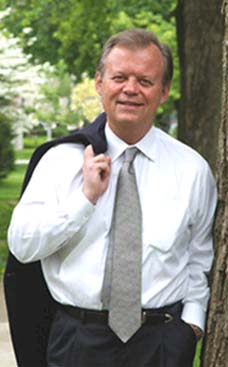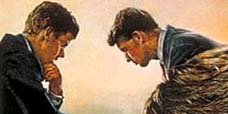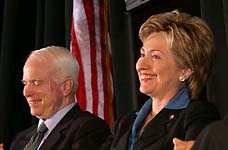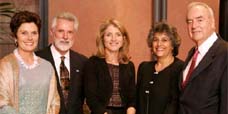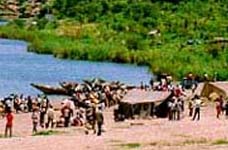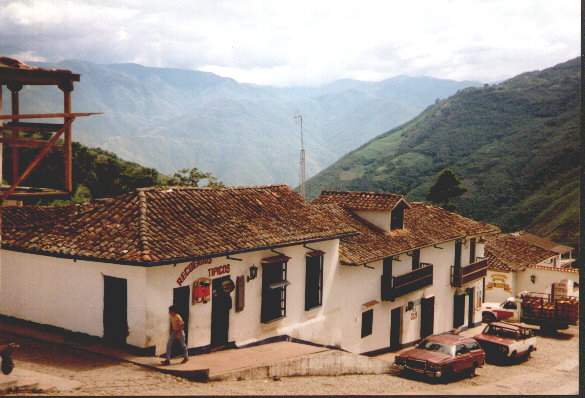
Once the initial disappointment of my assignment wore off, I took to this task with gusto during my training in Tucson, Ariz. But in Venezuela, after weeks and months of endless trips up and down the dusty highway, I had made no progress and was ready to quit.
Lee Fisher writes: In the years to come, I will be asked many times whether the time I spent in Venezuela was worthwhile. I will always start to say no, my time there really came to nothing. But then I stop, and instead tell the story of Pablo Morillo.
Lee Fischer: My friend Pablo made it worth it
01:00 AM EST on Saturday, January 7, 2006
THE STATE OF JULIAN, Venezuela
OPPRESSIVE HEAT and vegetation close in on the dusty red dirt road that twists up through the steep hills before me.
I stand for a long moment beside the main Zulian highway that permits access to this road. I know I will find the tiny village of Campo Verde at the end of the hike through the hills. I hope that I will also find my former colleague, Pablo Morillo.
Five years ago, I left Campo Verde and Pablo behind. Trudging down this very road to the highway where I now stand, I hailed a passing truck and began a journey that would take me first to Cabimas, then to Maracaibo, on to Caracas and eventually to Boston to start a new life.
Pablo had been my student. He had been my only student and he had delighted, amazed and frustrated me. I was supposed to have many students, all bright and eager, ready to learn. But only Pablo was faithful and studious, and patient with me when I forgot my Spanish. When I last saw Pablo, he was 78. I was 24.
Before 9 a.m., when I left Cabimas on the bus, sweat had already soaked through my shirt. At noon, the creaky bus, dustier than the road before me, spit me out at the bottom of the ascent to Campo Verde. The bus sputtered on and then I was utterly alone.
I am stunned that my guts grind with the same fear I often fought when I worked here long ago. I do what I did then -- take a breath and a step, a breath and a step. Finally, I start along the dirt road carrying only a light valise and under one arm a small trinket, a present for Pablo.
As I begin the steep and seemingly unending climb, iron-red dust puffs up with each footstep. Deeper into the jungle it is quiet except for the occasional buzz of an insect, and my labored breath becomes ragged as the climb steepens and dehydration sets in. Here, the jungle has a distinctive odor -- the gut-punch smell of dust and carrion. I follow the curve of the road up and up -- up past the endless green sea of trees, up through the brush and vines, up to Campo Verde.
* * *
When I first came to Campo Verde, I came as a Peace Corps volunteer to aid the people living in the small villages strung along the main highway between Cabimas to the west and El Venado to the east. Some towns, like Campo Verde, lie away from the highway, accessible only by simple footpaths or rough dirt clearings the campesinos (peasant farmers) refer to as "roads," with no hint of irony.
I plied the villages searching for failed and failing cooperatives, small businesses that the farmers set up as desperate foils against those who took advantage of their poverty, isolation and illiteracy.
I had joined the Peace Corps to dig wells with the people of the "Third World." I imagined building bridges and bringing health clinics to remote towns -- clinics that would save the lives of children. So said the ads, the literature, the recruiters and my own imagination, an effective amalgam that beckoned me to become the hero, the savior, the bwana.
But I dug no wells shoulder to shoulder with the campesinos of Venezuela. I built no bridges. I would start no health clinics and save no lives. Instead, I was assigned to teach accounting to the illiterate.
Once the initial disappointment of my assignment wore off, I took to this task with gusto during my training in Tucson, Ariz. But in Venezuela, after weeks and months of endless trips up and down the dusty highway, I had made no progress and was ready to quit.
Then I found Pablo. Pablo could read, write and do rudimentary math, meaning he could add and subtract, a skill unknown to almost every other farmer in Venezuela. Pablo was willing to learn and had the time for he had grown too old to farm anything more than the large vegetable garden he maintained behind his two-room cinderblock house.
When he signed up to learn bookkeeping to help the cooperatives of Campo Verde, I believed that he would be the first of many students I would teach. But there was only Pablo.
* * *
The road levels off and, at last, I see a house in the distance, the tiny house where Pablo Morillo lived during my assignment here. I have been walking for nearly two hours, shifting my valise from hand to hand and Pablo's gift from under one arm to the other.
Sweat soaks my pants and socks, drips off my face and hands, and stains the tops of my shoes. I do not know if he still lives in this house or even if he is still living. I have not announced my arrival and have had no contact with the people of the area since I left five years ago.
I plod on and then my heart leaps because I see him sitting by the front door. He sits under a portion of the tin roof extended in the style of the local farmers' huts to eke out a small patch of shade during the hot day. As I draw near, he doesn't appear to recognize me and, in fact, doesn't seem to be focusing on anything. I fear that he has gone blind. I am almost right. When I stand just a few paces from him, he looks at me as if I am only an indistinct blur. I can see that one eye is milked over with cataracts.
Pablo is a stout brown man made browner by years of working the fields with his back, hands and hoe. He squints at me from under a shock of white hair that riffs in the slight breeze, a hot miasma that shimmers more than blows. He wears a patched peasant shirt and pants, and his sandals, the same that all farmers wear, are made from the treads of old tires and re-used baling cord. After a moment, I call his name, Seor Morillo, and instantly he recognizes my voice.
Seor Fischer, he fairly sings, using the name he always insisted on using for me no matter how much I begged and demanded that he address me by my first name.
Pablo totters on his stool, rising to greet me with the traditional embrace, un abrazo fuerte, and I grasp his arm to steady him. We shake hands and hold onto each others' arms for a long time. Still holding on to me, Pablo calls to his wife, Marielena. Marielena comes to the door, smiles and disappears to fetch the boiled coffee, cafecito, which is served to every visitor. I am grateful to collapse onto a goatskin-covered stool next to Pablo.
We spend a long time sitting side-by-side drinking cafecitos and reminiscing, catching up, swapping stories of friends, sharing regrets and triumphs. But one triumph we cannot share is the success of the cooperative, for the long hours of bookkeeping work and instruction have come to nothing.
* * *
Soon after I left Venezuela, Pablo had to give up his bookkeeping duties because of poor health, including failing eyesight. Since no one else could learn the job, my long-held hope that my time here had come to some good instantly disappears.
We watch Campo Verde's life -- his life -- pass by on the rutted track in front of his small shanty. The common sights of rural Venezuela come and go. In the afternoon, a few barefoot kids race past on a mission to nowhere. A black burro wanders by searching the sere ground for any grass, dry or succulent, and shortly after one of the kids comes to fetch him. A mottled mother sow and a few piglets root here and there for whatever the village slops and nature have to offer. Skinny dogs and skinnier chickens are everywhere. Farmers coming in from the fields wave and call hello to the viejito Pablo. And then it is time to leave.
Pablo has told me that in three weeks he and Marielena will move to live with a granddaughter in Barquisemeto. I know that large industrial city, and it makes me sad that they will go there, for it is a cramped, dirty place that will mercilessly wear them down. I say only that I am glad they will have their granddaughter to look after them. I stand and start to say my goodbyes.
Pablo also stands and puts a hand on my shoulder. I want to show you something, he says, and, to my puzzlement, he pulls a pen from his pocket. You gave me this pen, he says, and, thunderstruck, I remember. When I left Venezuela I had given long thought to a parting gift for Pablo. I finally decided on something that I thought would have significance, something we shared, something he would actually use: a pen. Not just any pen, a wonderful pen, gold and sleek, the likes of which neither Pablo nor anyone in Campo Verde had ever seen before.
When we worked together, the thing that struck me most about this sweet and humble man was how proud he was that he had taught himself to read and write. But when he put pen to paper, he did not just write. He drew each letter as an artist lovingly draws a face. To this day, I have never seen more beautiful handwriting.
In truth, his handwriting had caused me much frustration for the time I waited, watching as he drew his perfect letters in the bookkeeping ledgers, seemed to me an eternity. I often encouraged him to go faster, sometimes forcefully, and sometimes I rebuked him angrily for his slowness. Pablo would only smile and try harder.
In no small sense, the pen had been both an apology and recognition of his unique talent.
* * *
I had forgotten about the pen. Its gold glints in the late afternoon sun as Pablo holds it out to me. Do you remember that you gave me this pen?, he asks. Yes, I say. Holding the pen, I remember all too well. Pablo says, I want to show you something else and he pulls out another pen, a cheap plastic ballpoint, the kind we used for bookkeeping.
Smiling proudly, his eyes struggling to focus on my face, he says, "I always carry this second pen, so that if someone at the bodega or at church asks to borrow a pen, your gift is never out of my possession."
It is too much, and I turn to wipe away the tears. I return the pen and again I say my goodbyes. I know I will never see Pablo again and this sadness overwhelms the joy of having seen him. I leave my new gift, a trinket, behind with him, and turn toward the blurry road down to the highway.
In the years to come, I will be asked many times whether the time I spent in Venezuela was worthwhile. I will always start to say no, my time there really came to nothing. But then I stop, and instead tell the story of Pablo Morillo.
Lee Fischer is from Dallas. This piece originated in Glimpse Magazine, an international news, travel and feature magazine (www.GlimpseAbroad.org).





